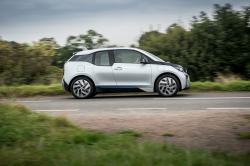
— A BMW i3 REx (range extender) class action lawsuit is over after an appeals court agreed with the conclusions reached by a lower district court.
The BMW i3 REx lawsuit was filed in 2016 regarding 2014-2016 cars advertised with range extenders which are small gas tanks that take over when the batteries drop below 6.5%.
According to the plaintiffs who sued, defects cause the BMW cars to lose power and speed when the range extender is activated.
The class action alleges the BMW i3 REx fuel extender takes the range from 81 miles to 150 miles per battery charge.
The i3 REx lawsuit alleges customers overpaid for the cars because the range extenders cause problems with power and speed under certain conditions.
According to BMW, with the range extender engaged and the battery charge falls below two percent, a warning alerts a driver of an upcoming reduction in drive power.
The power is reduced to help avoid a “complete discharge of the high-voltage battery.”
According to the BMW class action lawsuit, all named plaintiffs and plaintiffs’ expert experienced deceleration below two percent battery charge when "(1) driving at highway speeds, (2) in extreme temperatures, or (3) when driving on steep uphill gradients."
After several court actions, the class action lawsuit had been reduced to California owners only. But the district court subsequently granted summary judgment to BMW on all claims
BMW i3 REx Lawsuit Appeal
After the case was dismissed, the plaintiffs appealed to the U.S. Court of Appeals for the Ninth Circuit.
The appeals court found the plaintiff's expert didn't offer an opinion on if the deceleration issue rendered the design of the i3 REx defective.
According to both parties, the existence of a design defect is an essential element of all claims.
The plaintiffs argue expert testimony is not required to survive summary judgment because state law permits a jury to find a design defect where “the product failed to perform as safely as an ordinary consumer would expect when used in an intended or reasonably foreseeable manner.”
The appeals court says the test is known as the “consumer-expectations” test and does not require (or even permit) expert testimony.
“[E]xpert witnesses may not be used to demonstrate what an ordinary consumer would or should expect.”
But the court found the consumer-expectations test cannot apply because it “is reserved for cases in which the everyday experience of the product’s users permits a conclusion that the product’s design violated minimum safety assumptions.”
“[T]he ordinary consumer of an automobile simply has no idea how it should perform in all foreseeable situations, or how safe it should be made against all foreseeable hazards.”
According to the Ninth Circuit:
"Plaintiffs have offered no other applicable theory of recovery that would allow them to survive summary judgment without an expert opining as to a design defect. As noted above, plaintiffs’ expert explicitly declined (several times) to offer an opinion as to whether the i3 with the REx was defective."
The expert simply confirmed what BMW already admits, which is when the battery drops below two percent, the i3 REx is designed to limit power and speed under certain driving conditions to extend the range.
"Thus, plaintiffs failed to satisfy their evidentiary burden to establish the existence of a defective design, which is fatal to all claims. The district court properly awarded summary judgment to BMW." — U.S. Court of Appeals for the Ninth Circuit
The BMW i3 REx class action lawsuit was filed in the U.S. District Court for the Central District of California: Braverman, et al., v. BMW of North America, LLC, et al.
The plaintiffs are represented by Hagens Berman Sobol Shapiro, Chimicles & Tikellis LLP, MLG Automotive Law, and the Margarian Law Firm.




